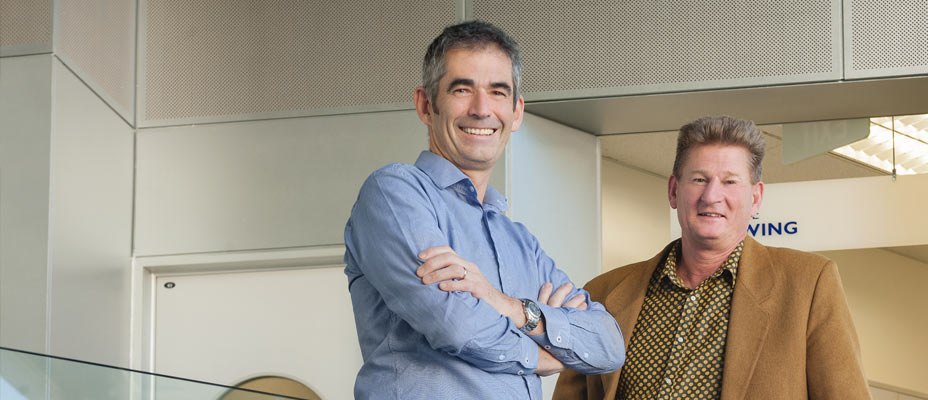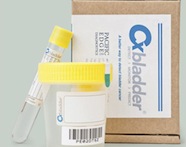
At the edge
Dunedin-based Pacific Edge Limited has become a biotechnology “start-up” success story, winning innovation awards and securing entry for its non-invasive Cxbladder diagnostic test into the lucrative US market.
Commitment to innovation and a beneficial relationship with the University of Otago, has kept Dunedin-based biotechnology company Pacific Edge Limited at the cutting edge of the domestic and international markets.
The company, which specialises in the development and commercialisation of non-invasive diagnostic tests for the early detection and management of cancer, was recently awarded the New Zealand Biotech Association's top bioscience company award for 2014. The NZBIO, comprising members working in the industry, named Pacific Edge as the company most active in building the profile and credibility of biotechnology and biotechnology companies in New Zealand.
Chief executive David Darling (above right) says the award is another indicator of Pacific Edge's steady growth towards being a “specialist, one-stop shop for bladder-related diagnostics”.
Since forming in 2001, the company has remained committed to developing products and new technologies for a more thorough understanding and earlier detection of tumours, to provide better patient outcomes, he says.
At around the same time, the human genome was first sequenced and Pacific Edge immediately recognised the potential for genetic research to underpin the development of “significantly better tools” for non-invasive cancer testing. Existing diagnostic tests were late-stage procedures and “as a result, the outlook for patients was poor”, he says.
Having secured seed funding, Pacific Edge spent the first three years developing a gene-expression database that has become its “cornerstone asset” and from which all current products have been derived.
They now market tests that quantify the expression of selected genes that represent a tumour's development, progression and gene signature. Crucially, this information is identifiable in the early stages of cancer growth.
Darling says basing the company's research and new product development facilities alongside the head office in Dunedin has real advantages for communication, efficiency and working with the subsidiary companies while maintaining a close working relationship with the University.
“The operational procedures that have been rolled out internationally were developed in our commercial laboratory in Dunedin. This means our bladder cancer technology is available through a highly regulated and specified model – wherever it is established the clinical experience is standardised.
“The preferred business model is based around a franchise arrangement, but we own the subsidiary. In the United States, for instance, the company is 100 per cent owned by us, Pacific Edge Diagnostics, which markets our technology in both the US and New Zealand.”
With the establishment of a franchise in the United States, the company has realised an immediate priority of a cohesive entry into the world's largest biomedical market; there are 10,500 urologists in the US compared with only 300 in Australia and New Zealand combined. Its first product in this market is the non-invasive bladder cancer test, Cxbladder.
The company hopes to capitalise on a lack of direct market competition. The existing gold-standard technology is an endoscopy of the urinary bladder via the urethra called a cystoscopy.
“Physical examinations are both invasive and extremely expensive. Cxbladder represents the opposite – a simple urine sample test that can only be conducted in Pacific Edge's laboratories. The company owns the intellectual property to run the samples, and we own the relationship between the five genes and the disease. It is extremely accurate compared with the invasive techniques, which is very compelling for urologists and patients.”
 “We now have a product that is smarter and better, and which replaces many existing tools which don't add much to the clinical perspective."
“We now have a product that is smarter and better, and which replaces many existing tools which don't add much to the clinical perspective."
Cxbladder was supreme winner of the 2013 New Zealand Innovators Awards and is currently being assessed by New Zealand District Health Boards as a potential routine service for hospitals nationally.
In 2013, three large provider networks – FedMed, ACPN and Stratose – signed contracts giving millions of patients in the US access to the company's health-care services and technology. MultiPlan was signed in early 2014 giving the company a clean sweep of the major National Provider Networks.
Darling says the company's custom diagnostic laboratory can conduct 260,000 Cxbladder tests per year, but that is “entirely scalable” because analytical machines and laboratory staff can be added if that capacity is reached.
Pacific Edge's entry into the market is commercially timely, given the “complete dearth of research in this area” and the increasing incidence rate of bladder cancer – it is now the ninth most prevalent cancer globally and the fourth most prevalent in men. Darling says that while women have a lower incidence rate their mortality rate is higher because they are often not tested as thoroughly; bladder cancer continues to be regarded as a male disease.
Increased access to accurate testing will become a more pressing issue in countries with an ageing population.
“There is also an increased risk associated with smoking and a direct correlation with exposure to dermally or respiratory absorbed toxins.”
Feedback from those working with bladder cancer has been invaluable, he says.
“We have worked with various key opinion leaders in the field – several lead urologists, product advisors and specialists on the company's scientific and clinical advisory boards – and it has shown the way forward is with input from those working with product development and in-market activities.
“We now have a product that is smarter and better, and which replaces many existing tools which don't add much to the clinical perspective.
“As we captured urologists and customers, and developed the product in the marketplace we found there was a great need for more tools that would focus on specific features or needs in the evaluation and management of bladder cancer. We are in the process of building new products that address different needs and we intend to launch a second product later in 2014 that addresses a specific area that urologists have identified.”
The company also benefits from a legacy agreement between the University of Otago and Pacific Edge. As part of the agreement at the inception of the company, the University received a 25 per cent share and committed to contribute future ongoing pieces of intellectual property for Pacific Edge to commercialise as a “pathway to market” company.
“Backing a new 'start-up' was a big commitment and, because of the agreement, we have maintained a very close relationship with the University. It's a good example of how you can couple academic capability and resources from the University with a commercial enterprise and make a lasting legacy-type arrangement that benefits both parties,” Darling says.
Pacific Edge's chief scientific officer, University of Otago Professor Parry Guilford, is one of the founders of the company and a key scientist behind much of the discovery of the company's products.
Guilford, who also serves as director of the University of Otago's Centre for Translational Cancer Research and director of Cancer Genetics Laboratory (CGL), says the relationship between the company and the University is mutually rewarding.
“The relationship is beneficial for a number of reasons and one of those is funding. Often, funding only covers the initial stages of research, but by showing evidence of a competitive transitional path to market we can attract good funding grants. Also, it is rewarding to provide clinicians with something they can use to improve patient outcomes.”
A shortage of clinical samples can hamper first-stage research, but Guilford says access to material from the company's extensive international network of urology clinics is an invaluable tool.
The next step for the collaboration is further development of a diagnostic platform for various cancer types that uses fluid that has been in contact with a tumour to isolate single cancer cells so that they “really stand out in the sea of normal cells”.
“Away from commercial pressures, University researchers can ensure the research is good and robust, and collaborate with other researchers in a way that commercial laboratories might not be able to.
“In my view, the model that we have is the ideal one, where you break the back of a technical problem inside the academic environment before moving to the commercial area.”
Find out more about Cxbladder
SAM STEVENS